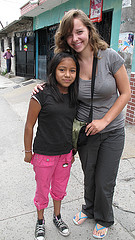Comfort in Company
 The art of portraying perspective is a difficult one, especially for me. But I’ll give it a go. First and foremost, I will attempt to portray my sincere thanks for you—the DGFUMC congregation—and your support. Financing my plane ticket to Guatemala City is a generosity that I, as a college student, have immense gratitude. Even more importantly, I want to thank you all for your prayers and kind words. It was so special and uplifting to hear that I have been in your hearts and minds this summer. There were brief moments while I was in La Esperanza and I felt either unimportant or discouraged or alone that were pacified with kind words that were passed along by my mother. It is amazing how a mere awareness that there is even just one person (let alone an entire network of people) thinking about you can soothe the heart and ease the mind. For me, solidarity is its own form of bliss, particularly while living in a slum of Guatemala. And for this piece of peace, I sincerely thank you all from the bottom of my heart.
The art of portraying perspective is a difficult one, especially for me. But I’ll give it a go. First and foremost, I will attempt to portray my sincere thanks for you—the DGFUMC congregation—and your support. Financing my plane ticket to Guatemala City is a generosity that I, as a college student, have immense gratitude. Even more importantly, I want to thank you all for your prayers and kind words. It was so special and uplifting to hear that I have been in your hearts and minds this summer. There were brief moments while I was in La Esperanza and I felt either unimportant or discouraged or alone that were pacified with kind words that were passed along by my mother. It is amazing how a mere awareness that there is even just one person (let alone an entire network of people) thinking about you can soothe the heart and ease the mind. For me, solidarity is its own form of bliss, particularly while living in a slum of Guatemala. And for this piece of peace, I sincerely thank you all from the bottom of my heart.
To illustrate a little more context, for the past two months I have been residing on the roof of UPAVIM in La Esperanza, Guatemala. La Esperanza is a settlement a little outside of Guatemala City, and UPAVIM is a beacon of light in this obscure place known as La Esperanza. Esperanza means “hope,” which is ironic due to the fact that it is a place where hope is a concept often sought out in a gang, or at the bottom of a bottle, or behind the barrel of a gun. This is a place where there is no perceivably positive option to create a livelihood. Life is going to be hard, hard and relatively hopeless. The women that I met at UPAVIM are an exception. These women have committed themselves to an organization whose mission is to better the lives of people within the community (Unidas Para Vivir Mejor—United to Live Better). The beautiful people I grew acquainted with at UPAVIM are the embodiment of hope. Their work and their commitment to this organization is a living symbol for hope—for better education for their children, safer living conditions, as well as happier and healthier relationships.
Every weekday morning I woke up to a combination of: the melody of rooster crows, the persistent honking of empty taxis (they park and beep until someone gets in), and the shouting of the tamale vendor lady. I would then make my way down the three floors of UPAVIM and outside and around the building to a magical and terrible place called the panadería (bakery). Let’s just say that it turns out, carbs do still count in Guatemala. Lily, an UPAVIMa of many years, would greet me and then send me on my way a couple quetzales poorer and a bag of bread richer. Then, I would walk back around and Estela would buzz me into the building. Dona Dina and Marisol would be right inside, welcoming the arriving and adorable Montessori children, while Doña Amanda received sleepy infants and cradled them to the nursery. I would make my way back upstairs, exchanging bright greetings each floor, with whoever was waiting for the pharmacy and then with the bustling ladies on the artesanía level. After enjoying the view of the volcano and an egg sandwich (I’m no culinary artist) on the roof, I’d make my way back downstairs repeating the “buenos días” practice. Then I would walk outside, past UPAVIMa Clara and a cooler of the soy milk that she made the day before (the strawberry flavor was my favorite), and around to the ground floor of connecting building where the Reforzamiento (tutoring) area is.
The Reforz program serves to reinforce math, reading, writing, and other components of school curriculums in the area from Preschool to grade 6. For the year, the cost for each child is 5 quetzales (about $0.65). Currently, there are about 50 kids enrolled, which is only a small fraction of the large amount of youth in the area. One day, we hope for the program to be free. Reforz is an amazing part of the UPAVIM organization for a multitude of reasons; it supports and emphasizes education while also providing a safe and positive environment for these kids.
The morning hours were when children who are not enrolled in school would come in. I learned that there are a variety of reasons why kids are not getting an education in La Esperanza: they do not have money, they failed a grade multiple times and their parents don’t want to ‘waste’ money, or their parents simply do not care. The A.M. attendance was sparse and inconsistent, which was one of my biggest mental challenges. In the two months I worked in the Reforzamiento program, I got to know the kids that came in the morning on a particularly personal level, and it was particularly difficult for me to know their personal circumstances. It is not uncommon for violence, abuse, and neglect to be very present elements of their daily lives.
My time with all of the kids in the Reforzamiento program is something I will value and hold close to my heart for the rest of my life. I would like to think that I was able to help with their abilities to tell time, do long division, or write a poem, but I have comfort in knowing that in a community whose streets are littered with drugs and plagued with violence, these kids had an hour in a loving environment with access to books, games, and materials that would otherwise be inaccessible. There are very limited places for the children of La Esperanza to go and be safe and feel loved, UPAVIM facilitates such a place. Each child that came into the tutoring program was happy to be there and it was a joy to be there with them. Every day I was blessed with an innumerable amount of hugs and smiles from kids that didn’t choose to live in extreme poverty or bear witness to the frequent atrocities of gang activity.
Pain and struggle are difficult things to convey in words, and terrible burdens to bear alone. UPAVIM provides solidarity among women who share the reality of La Esperanza. I heard so many stories from so many people, from both the women and children. Empathy soothes suffering in a way that the tangibilities of life cannot. There’s a comfort in knowing that someone is willing to listen and understand. Building and maintaining caring, interpersonal relationships is an important part of supporting these women and children. The connections that many of you at the DGFUMC congregation have with UPAVIMas are consequential; the people who are impacted deeply appreciate each of these interactions and experience them as an important part of the hermanamiento with our church. My experience with these women and children stands as a testament that tribulations are better faced with company, regardless of distance or difference.
Paz y Amor,
Lexie
- Lexie Faber's blog
- Log in to post comments
God, as known to us in Jesus Christ, welcomes all.
We welcome people of any race, national origin, ethnicity, gender, sexual orientation, age, social or economic status, employment status, or life situation; including people with physical or mental illness or disability.
We practice loving acceptance of each person and respectful discussion
 of our differences.
of our differences.
Affiliated to Reconciling Ministries Network
Recent News
Sunday Worship Service - July 30 at 10:00 am
July 30, 2023 - 9:51am
Sunday Worship Service - July 23 at 10:00 am
July 23, 2023 - 9:48am
Sunday Worship Service - July 16 at 10:00 am
July 16, 2023 - 10:17am
Vacation Bible School
July 14, 2023 - 10:10pm
Sunday Worship Service - July 9 at 10:00 am
July 9, 2023 - 9:53am






